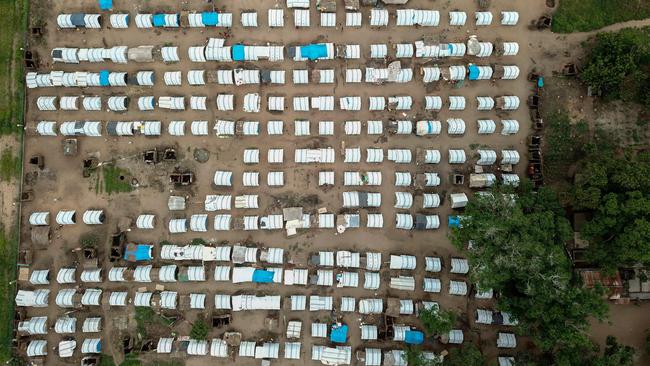US sanctions Islamic State’s central African franchise for first time
Move underscores rising threat of radical group outside Middle East.

The US on Thursday AEDT imposed sanctions on two of Islamic State’s fast-growing affiliates in Central Africa for the first time, underscoring the rising threat posed by the group outside the Middle East.
The State Department said it was targeting the assets of the Congolese franchise of Islamic State in Iraq and Syria and its leader, Musa Baluku, along with an affiliate in nearby Mozambique and its commander, Abu Yasir Hassan. The designation requires banks to freeze the assets of these individuals and groups and bans any dealings with them.
“Today’s designations notify the US public and the international community that these groups have committed or pose a significant risk of committing acts of terrorism,” the State Department said.
The move underscores how ISIS has been able to grow again after its defeat in Syria and Iraq and regroup outside the Middle East, including in sub-Saharan Africa. The two groups, which operate as ISIS’s Central African franchise, have become some of the most lethal among the group’s global affiliates and are threatening billions of dollars of US-funded oil and gas projects in East Africa.
In 2017, ISIS was on the defensive in its stronghold in Syria and Iraq when it started reaching out to a Democratic Republic of the Congo-based Islamist group called the Allied Democratic Forces and a separate jihadist insurgency in Mozambique named Ansar al-Sunna.
While most elements of
the two entities formally joined the Middle Eastern group two years later, Western counter-terrorism officials had initially expressed doubt about the depth of the connection between ISIS’s central command and the Africa-based insurgencies.
“ISIS affiliates in Central Africa have been increasingly active in recent months; and we are concerned by their growth,” a State Department spokeswoman told The Wall Street Journal last month.
According to the department, ISIS’s Congolese branch killed over 849 civilians in 2020 alone while attacks by the branch in Mozambique led to the displacement of nearly 670,000 people.
“In concert with the group’s stronger ties with ISIS, the ADF has adopted a much more attractive recruitment narrative by focusing on the creation of an Islamic caliphate in Central Africa, making it the most formidable and deadly armed group in the Eastern Congo,” said Laren Poole, chief operating officer of the Bridgeway Foundation, which investigates the region’s insurgencies.
“Given this part of eastern Congo’s porous borders and large swaths of ungoverned territory, the group is also operating in an ideal location to receive foreign recruits with minimum government interference.”
ADF attacks in Congo feature increasingly prominently in ISIS’s global propaganda, with Baluku, now saying the two groups are fully unified, according to a report released by the Program on Extremism at George Washington University. “There is no ADF anymore,” the report quoted Baluku as saying.
The ISIS franchise in Mozambique is also threatening a $US16bn natural-gas project led by Total in the north of the country, forcing the French company and US contractors to pull out expatriates.
The US’s Export-Import Bank is backing the project with $US4.7bn in financing, which it says will support an estimated 16,700 American jobs over the five-year construction period.
The Wall Street Journal



To join the conversation, please log in. Don't have an account? Register
Join the conversation, you are commenting as Logout